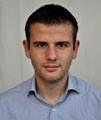Upcoming Webinar and Special Offer!

Upcoming Webinar and Special Offer!
29 January 2019
Webinar Topic: “Adaptive Importance Sampling: The Past, the Present, and the Future”
Presented by Dr. Víctor Elvira and based on the article published in the IEEE Signal Processing Magazine
| Speaker: Dr. Víctor Elvira Department of Communication Systems IMT Lille Douai, France |
Date: 29 January 2019 Time: 11:00 am EST Duration: Approximately 1 hour Register: Attendee Registration Special Offer: Original article will be open for free download during the day of the event! |
Abstract:
In many problems of signal processing, the interest is in estimating unknown static variables given a set of observations. The hidden parameters and the available data are usually related through a specific model. Under the probabilistic Bayesian framework, the objective is more ambitious than simply calculating point-wise estimates of the unknowns and amounts to obtaining their posterior distributions. While for simple models, the posterior distributions can be characterized in a closed-form expression, however, in most practical scenarios they cannot be computed. Importance sampling (IS) is an elegant, theoretically sound, and simple-to-understand methodology for approximation of moments of distributions. The only condition relates to the capability of the point-wise evaluation of the targeted distribution. The basic mechanism of IS consists of (a) drawing samples from simple proposal densities, (b) weighting the samples by accounting for the mismatch between the targeted and the proposal densities, and (c) approximating the moments of interest with the weighted samples. The performance of IS methods directly depends on the choice of the proposal functions. For that reason, the proposals have to be updated and improved with iterations so that samples are generated in regions of interest.
In this talk, we will first introduce the basics of IS and multiple IS (MIS), motivating the need of adapting the proposal densities. Then, the focus will be on describing an encompassing framework of AIS algorithms available in the current literature. We will summarize the different strategies and their computational complexity, as well as will indicate their possible parallelization and other useful information for practitioners. Comparisons among the different algorithms and discussions about their advantages and disadvantages will also be provided. Finally, a numerical example and a study of the performance of various algorithms.
Speaker's Biography:

Dr. Víctor Elvira received his M.Sc. degree in electrical engineering in 2008, and his Ph.D. degree in wireless communications in 2011, all from Universidad de Cantabria (Spain). From 2012 to August 2016, he was with the Department of Signal Theory and Communications at University Carlos III of Madrid (Spain) as Assistant Professor. In September 2016, he joined the Department of Communication Systems at IMT Lille Douai where he is currently an Associate Professor. He has also been a Fulbright Fellow at the Department of Electrical and Computer Engineering in Stony Brook University.
Dr. Elvira's research interests are in the field of statistical signal processing, in particular in Monte Carlo methods for Bayesian inference, stochastic optimization, and adaptive filtering, with different applications including biomedicine, sensor networks, wireless communications, and target tracking, where he has co-authored more than 70 journal and peer-reviewed conference papers.

